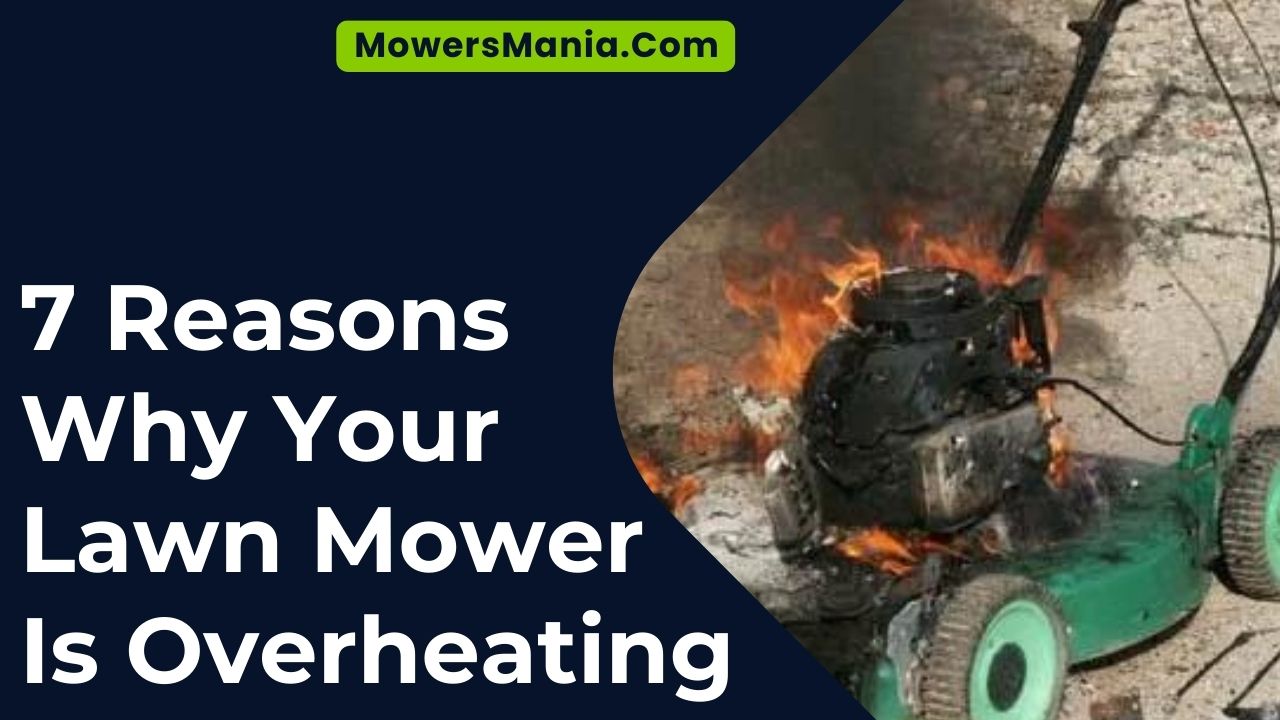Having trouble with your lawn mower running a little too hot? Here are 7 reasons why it might be overheating.
Check out these common issues that could be causing your mower to heat up.

Dirty Air Filters
Your lawn mower may be overheating due to the accumulation of dirt and debris in the air filter. When the air filter gets clogged, it restricts the airflow to the engine, causing it to overheat.
To solve this issue, start by locating the air filter, usually housed in a plastic or metal case near the carburetor. Unsnap or unscrew the cover, and carefully remove the air filter.
If it’s made of foam, wash it with soap and water, then let it dry completely before reinserting. For paper filters, gently tap them on a hard surface to dislodge the dirt, or use compressed air to blow out the debris.
If the filter is too dirty or damaged, it’s best to replace it with a new one. Regularly cleaning or replacing the air filter, especially at the beginning of the mowing season, will ensure proper airflow to the engine, preventing it from overheating and prolonging the life of your lawn mower.
Low Oil Levels
Check your oil regularly to ensure it’s at the recommended level, as low oil levels can cause your lawn mower to overheat.
Insufficient oil can lead to increased friction and heat, which in turn can damage the engine.
Maintenance of oil levels is crucial for the proper functioning and longevity of your lawn mower.
Insufficient Oil Causes Overheating
Make sure to regularly top up your lawn mower’s oil to prevent overheating. Insufficient oil can cause the engine to overheat as it struggles to lubricate and cool the moving parts.
When the oil level is too low, there isn’t enough lubrication to reduce friction between the engine components. This increased friction generates excess heat, leading to overheating.
Additionally, without sufficient oil, the engine’s cooling system can’t function optimally, further contributing to the overheating problem. To avoid this issue, check the oil level before each use and top it up as needed.
Proper maintenance of oil levels not only prevents overheating but also prolongs the lifespan of your lawn mower’s engine, saving you from costly repairs or replacements.
Check Oil Regularly
Regularly monitoring the oil level in your lawn mower is crucial for preventing overheating issues. Low oil levels can lead to increased friction and heat, causing your mower to overheat. Check the oil level before each use and top it up as needed. Use the following table as a guide to understand the consequences of neglecting oil checks:
| Neglecting Oil Checks | Consequences |
|---|---|
| Infrequent checks | Increased friction |
| Ignoring low levels | Excessive heat buildup |
| Delayed maintenance | Potential engine damage |
| Lack of oil changes | Reduced mower lifespan |
Oil Level Maintenance Crucial
Ensuring your lawn mower’s oil level is maintained at the appropriate level is crucial for preventing overheating issues.
Low oil levels can lead to increased friction and heat within the engine, causing it to overheat.
It’s important to regularly check the oil level using the dipstick and top it up as needed with the recommended oil for your mower.
When the oil level is low, the engine components aren’t properly lubricated, leading to increased wear and tear, which can ultimately result in overheating and potential long-term damage.
Neglecting oil level maintenance can also void the warranty on your lawn mower.
Therefore, make it a habit to check the oil level before each use, and change the oil at the recommended intervals to keep your mower running smoothly and prevent overheating.
Clogged Cooling Fins

If your lawn mower’s cooling fins are clogged with debris, it’s causing the engine to run too hot. This can lead to overheating and potential damage to the mower.
Regular maintenance is crucial to ensure the cooling fins are clear and airflow isn’t obstructed.
Debris Blocking Airflow
Clearing debris from the cooling fins is essential for preventing your lawn mower from overheating. When grass clippings, dirt, and other debris accumulate on the cooling fins, they block the airflow needed to keep the engine cool. This blockage causes the engine to work harder and hotter, ultimately leading to overheating.
To address this issue, turn off the mower and disconnect the spark plug. Then, using a brush or compressed air, carefully remove the debris from the cooling fins. Take care not to damage the fins in the process.
Regularly inspecting and cleaning the cooling fins after mowing can help maintain proper airflow and prevent overheating issues, ensuring your lawn mower operates efficiently.
Engine Running Too Hot
You can prevent your lawn mower from overheating by regularly checking and clearing any debris that may be clogging the cooling fins.
When the cooling fins are clogged with grass clippings, dirt, and other debris, the engine can’t dissipate heat effectively, causing it to run too hot.
This can lead to overheating and potential damage to the engine if not addressed promptly. To avoid this issue, make it a habit to inspect and clean the cooling fins after each mowing session.
| Debris | Effects | Solution |
|---|---|---|
| Grass | Blocks airflow | Use a brush to clear debris |
| Dirt | Reduces cooling | Compressed air for cleaning |
| Debris | Traps heat | Regular maintenance |
| Leaves | Impairs cooling | Visual inspection |
| Clippings | Causes overheating | Clearing after mowing |
Regular Maintenance Crucial
Regularly maintaining your lawn mower’s cooling fins is essential to prevent overheating and ensure optimal performance.
Over time, the cooling fins can become clogged with grass clippings, dirt, and debris, obstructing the airflow and causing the engine to overheat. To prevent this, it’s crucial to inspect and clean the cooling fins regularly.
Start by disconnecting the spark plug to ensure safety, then use a brush or compressed air to remove any buildup. Additionally, make sure that the area around the cooling fins is free from grass and debris to allow for proper ventilation.
Faulty Spark Plugs
If your lawn mower is overheating, it may be due to faulty spark plugs causing inefficient ignition of the fuel-air mixture.
Faulty spark plugs can lead to incomplete combustion of the fuel, resulting in increased heat production and ultimately causing your lawn mower to overheat.
Here are some signs that your spark plugs may be faulty:
-
Difficulty starting the lawn mower: If your lawn mower is struggling to start or requires multiple attempts to ignite, it could be a sign of faulty spark plugs.
-
Rough idling: If your lawn mower engine is running unevenly or shaking while idling, it may indicate spark plug issues.
-
Poor fuel economy: Faulty spark plugs can lead to decreased fuel efficiency, causing your lawn mower to consume more fuel than usual.
-
Engine misfires: If you notice intermittent sputtering or popping sounds from the engine, it could be a result of faulty spark plugs misfiring.
-
Lack of power: When your lawn mower lacks power during operation, it could be due to inefficient ignition caused by faulty spark plugs.
Mowing in High Temperatures
During prolonged use in high temperatures, your lawn mower can experience overheating issues exacerbated by the ambient heat. The engine works harder to maintain its operating temperature, leading to increased heat buildup when mowing in hot weather.
This combination of high outdoor temperature and heat generated by the mower’s engine can push the machine beyond its thermal limits, causing overheating.
In addition to the already high outdoor temperature, the air around the mower is often hot and less dense in high temperatures. This reduces the cooling effect on the engine and makes it more challenging for the mower to dissipate heat effectively.
To mitigate overheating while mowing in high temperatures, consider mowing during the cooler parts of the day, such as early morning or late afternoon. This can help reduce the strain on the mower’s engine and prevent excessive heat buildup.
It’s also important to ensure that the mower’s air vents and cooling fins are clean and free from debris. This allows for optimal airflow and heat dissipation.
Furthermore, regularly checking and maintaining the mower’s cooling system can help prevent overheating issues. This ensures smooth operation even in high temperatures.
Worn or Dull Blades
One common reason your lawn mower may be overheating is due to worn or dull blades, which can increase the resistance encountered during mowing. This increased resistance forces the engine to work harder, leading to overheating.
Here are some signs that your lawn mower blades may be worn or dull:
- Uneven grass cutting, leaving behind straggly patches of grass.
- Grass blades that appear torn or jagged instead of cleanly sliced.
- Increased vibration while mowing, which can be felt in the handle or seat of the mower.
- Excessive noise during mowing, indicating that the blades are struggling to cut through the grass.
- Grass that has a frayed or brown appearance after mowing, rather than a clean, green cut.
To prevent your lawn mower from overheating due to worn or dull blades, it’s essential to regularly inspect and sharpen or replace the blades as needed. Keeping sharp blades not only improves the mower’s performance but also ensures a healthier and more attractive lawn.
Restricted Airflow

Have you checked if the air vents and cooling fins on your lawn mower are clogged with grass clippings and debris, causing restricted airflow and contributing to overheating? Restricted airflow is a common reason for lawn mower overheating.
When the air vents and cooling fins are blocked, the engine can’t expel heat effectively, leading to overheating.
To address this issue, start by turning off the mower and disconnecting the spark plug to ensure safety. Then, use a brush or compressed air to carefully clean the air vents and cooling fins.
Pay close attention to areas where debris tends to accumulate, such as around the engine and under the mower’s deck. Regularly cleaning these components will help maintain proper airflow and prevent overheating.
Additionally, check the air filter regularly and replace it if it’s clogged with dirt and debris. Ensuring adequate airflow is crucial for keeping your lawn mower running smoothly and preventing overheating issues.
Frequently Asked Questions [FAQs]
Can Using a Lawn Mower With Overheating Issues Cause Long-Term Damage to the Engine?
Using a lawn mower with overheating issues can cause long-term engine damage. Overheating puts stress on the engine components, leading to premature wear and potential failure. It’s important to address overheating problems promptly to avoid costly repairs.
Are There Any Specific Brands or Models of Lawn Mowers That Are More Prone to Overheating?
Some lawn mower brands and models may be more prone to overheating due to factors like engine size, air flow design, and maintenance requirements. It’s important to research and choose a model that suits your specific needs.
What Are Some Signs That Indicate a Lawn Mower Is Overheating, Other Than the Obvious Increase in Temperature?
If your lawn mower is overheating, look out for signs like the engine stalling, unusual noises, or a decrease in power. Check for smoke, a hot engine, or a burning smell as well.
Is It Safe to Continue Using a Lawn Mower That Is Overheating, or Should It Be Immediately Shut off and Allowed to Cool Down?
If your lawn mower is overheating, it’s not safe to continue using it. Immediately shut it off and allow it to cool down. Continuing to use it could cause serious damage or even lead to a fire.
Are There Any Preventive Measures That Can Be Taken to Reduce the Risk of a Lawn Mower Overheating, Other Than the Common Maintenance Tips Mentioned in the Article?
To reduce the risk of lawn mower overheating, make sure the air filters are clean, the engine oil is at the right level, and the cooling fins are free of debris. Regular maintenance will keep your mower running smoothly.
Conclusion
So, if you notice your lawn mower overheating, don’t panic. Check your air filters, oil levels, cooling fins, spark plugs, and blades.
Make sure to mow in cooler temperatures and keep your mower clean to prevent restricted airflow.
With these simple maintenance tasks, you can keep your lawn mower running smoothly and avoid overheating issues.



